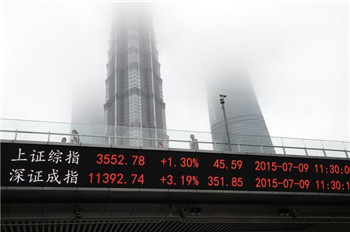(单词翻译:单击)

HONG KONG — Chinese investors, who have watched as their shares have gone down 30 percent or more over the past few weeks, got a reprieve on Thursday. Stocks rose as a series of market-propping government measures appeared to have the intended effect.
香港——在过去几周里看着自己的股票价值下跌30%或更多的中国投资者周四缓了口气。政府一系列的就市措施似乎有了预期的效果,股票开始上涨。
The main Shanghai index fell nearly 4 percent at the open of trading on Thursday but recovered to finish the day 5.8 percent higher, while shares in Shenzhen gained 3.8 percent. In Hong Kong, the Hang Seng index was up 3.9 percent, after falling nearly 6 percent the day before. Markets in the region also turned positive, with the Nikkei 225 share average in Japan and the Kospi in South Korea both closing 0.6 percent higher.
上海的主要股指周四开盘时一度下跌了4%,但很快恢复过来,最终以5.8%的增幅收盘,而深圳的股指上涨了3.8%。香港的恒生指数上涨了3.9%,这是在前天下跌了近6%之后。亚洲地区的其他市场也转为正值,日本的日经225平均股价指数和韩国的综合股价指数收盘时都上涨了0.6%。
But even as shares rose, there were warnings that mainland markets have further to fall. Valuations of many small companies remain too high, and the government and state-owned companies are unlikely to buy up those shares, preferring to bid up the prices of more fairly priced larger companies, analysts say.
但是,即使股价上涨,但仍有警告说,大陆的股市有进一步下跌的空间。分析人士表示,许多小公司的市值仍然过高,政府和国有企业不太可能会购进这些公司的股票,而是宁愿把市值更合理的较大公司的股价抬高。
The only solution to the market rout is for the Chinese central bank to further loosen up the flow of money to restore momentum to economic growth, said Li-Gang Liu, chief economist for greater China at the Australia and New Zealand Banking Group. “Once investors see a rebound in China’s real economy, confidence may return,” he said.
澳大利亚和新西兰银行集团的大中华区首席经济学家刘利刚说,解决市场溃败的唯一办法是,中国央行进一步放松货币流通,以恢复经济增长的势头。他说,“一旦投资者看到中国的实体经济出现反弹,信心可能就会回来。”
Economists are divided over how big of an impact the decline in the market will have on China’s economy, but many argue that itwill hurt consumer sentiment and limit the amount the middle class is willing to spend on goods and property. That would weaken consumption at a time when China’s economic growth is already slowing.
虽然经济学家们对股市下滑将对中国经济有多大影响的看法有分歧,但许多人认为,股市下滑会不利于消费者信心,并会使中产阶层限制其愿意花在购物和购置房地产上的钱的数量。这会在中国经济增长已经放缓的时候削弱消费。
According to an estimate by HSBC, about 15 percent of the assets of Chinese households are locked up in the stock market. Many are probably still holding shares whose value is quickly diminishing, unable to get rid of them because trading in those stocks has been suspended by the companies or the shares quickly drop after the market open to the daily 10 percent limit on losses.
据汇丰银行估计,中国家庭资产的约15%被套在了股市。许多人可能仍持有价值正在迅速减少的公司股份,无法将其出售,因为这些股票的交易或已被公司暂停,或在市场开盘后很快下跌超过每天10%的下限后停盘。
Shares of more than one-third of companies listed in Shanghai and Shenzhen are suspended from trading, in part from rules designed to limit price declines and put a check on panic selling.
超过三分之一的上海和深圳上市公司的股票交易停盘,这部分是由于股市的规则,这些规则的目的是限制股价大跌,防止由之引起的恐慌性抛售。
“These kind of administrative measures are continuing, and over all they will only have a limited effect,” said Mr. Liu. “The rules can probably stop the market rout temporarily, but it won’t change the overall fundamentals.”
“这种行政措施仍在继续,总体来说,它们只将会有有限的影响,”刘利刚说。“这些规则大概能让市场崩溃暂时停止,但无法改变整体市场的基本法则。”
Beijing continued to introduce measures to stabilize the markets on Thursday, with the Public Security Ministry saying that it was investigating “malicious” short sellers in a bid to cut down on illegal market activity, according to Xinhua, the state-run news agency.
北京在周四继续采取稳定市场的措施。据国家通讯社新华社报道,公安部称正在调查“恶意”做空者,以力图减少市场上的非法活动。
On Wednesday, China’s security regulator banned investors who hold more than 5 percent of a company from selling that company’s shares. The regulator also indicated that it would relax trading laws for corporate insiders looking to buy back shares at a low price. Large state-owned companies have been ordered to purchase shares, and the government has halted new initial public offerings and had brokerage firms form a market stabilization fund.
周三,中国的证券监管者宣布,禁止持有公司股份5%以上的大股东出售公司的股票。监管机构还表示,将对寻求低价回购股票的企业内部人士放宽交易法。大型国有企业已被责令回购股票,政府已停止首次公开募股,并让证券交易所建立市场稳定基金。
A potentially more worrying problem is that companies that took loans based on inflated share prices have invested that money back into the market. Still, Mr. Liu said that type of margin financing was only a small part, roughly 2 trillion renminbi, or $326 billion, of Chinese banks’ total balance sheets of 180 trillion renminbi, and therefore does not pose a major threat.
一个更令人担忧的潜在问题是,用膨胀的市值作抵押来借贷的公司,已将资金重新投入股市。不过,刘利刚说,这种类型的融资融券只是很小的一部分,大约为2万亿人民币,而中国所有银行的总资产负债表上有180万亿元,因此并不构成一个重大的威胁。


